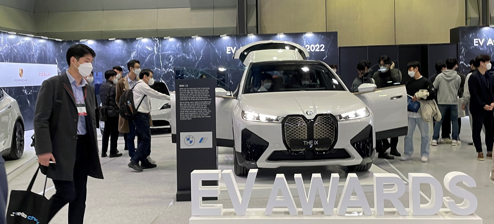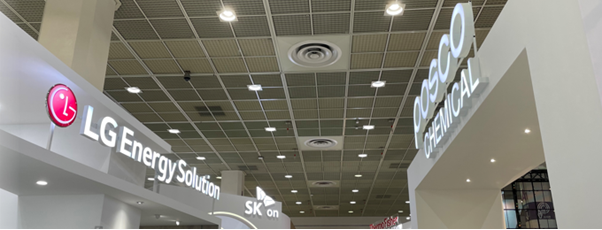
Recently the fifth annual ‘xEV Trend 2022’ ended its three-day show successfully, packed with visitors even during a time when Korea is experiencing some of the highest numbers of new COVID-19 cases to date. The significant number of visitors at the xEV Trend show demonstrates that Korea’s environmentally friendly vehicle industry is growing. At the show various sectors were on display, from e-mobility technologies and Battery/ECU/EV Motors, to Charging Equipment, Thermal management, and other related components.

This interest in Electric Vehicles (EV) is not just a Korea market trend, but rather an ongoing global change. With governments announcing restrictions for internal combustion engines and new regulations for carbon neutrality, the EV industry is exploding. Moreover, affordable prices for EV batteries and faster EV recharge times make the EV industry ever more accessible to consumers. In line with these developments, we provide here an overview of the growing EV industry in Korea.
Domestic Market
Globally, Korea is the fifth largest producer of all automobiles and projects to manufacture 4.5 million EVs by 2023, 9.1 million by 2025 and 15 million by 2030. Korea Automotive Technology Institute (KATECH) reported that in 2021 Hyundai/KIA ranked 5th in the global market by sales. In 2021, exports for EV increased 50% and one out of five vehicles domestically sold or exported was an EV. The Korea Automobile Manufacturers Association (KAMA) and Korean Automobile Importers & Distributors Association (KAIDA) estimated that in 2021 domestic EV sales made up 20.1% of all vehicle sales, increasing from 11.9% in 2020.
The domestic market for Battery Electric Vehicles (BEVs) was a battleground between Hyundai and Tesla, but the landscape changed in 2021 when Hyundai BEV sales increased rapidly. One key reason was the Korean government’s introduction of financial incentives for purchasing EVs. Korean consumers are eligible to receive up to KRW 8 million when purchasing an EV valued at KRW 60 million or less. The incentive is reduced as the vehicle price increases above that amount.
Since most Tesla BEVs are priced above the KRW 60 million price cap, lower-priced domestic vehicles have reaped the benefits. The sales gap between the two is only expected to grow, as the government has announced plans to reduce the vehicle price cap for the incentive to KRW 55 million while increasing its overall budget to support EV purchases.

Korea has localized most of the automotive parts and materials supply for internal combustion engine vehicles. However, to date localization for key EV parts, such as Motors, Reducers, Batteries, Onboard Chargers (OBC), and Electric Power Control Units (EPCU) stands at less than 70%.
The battery is the core factor of quality for an EV and covers about 20~40% of a vehicle’s raw material price. Korea possesses a stronghold on EV batteries, with three domestic players who fall in the global top 10 EV battery supply companies: LG Energy Solution (2nd), SK on (5th) and Samsung SDI (6th).
Policies and Regulations
As mentioned above, while the government’s overall funding for EV purchasing incentives has increased, it has reduced the vehicle price cap and the amount an individual consumer is eligible to receive. This change will have continued impact on the high-end EV market, encouraging consumer purchasing preferences for domestic or lower cost EVs to hold.
The Korean government is also investing more in localizing and developing domestic parts and component manufacturers. In 2021, the government announced that it will support manufacturing of 1,000 types of ‘future parts’ and components via funding initiatives for R&D, employee training, financial incentives, and support to develop production processes with smart factory benefits. In early 2022, the government announced a budget of KRW 22.4 billion to train up over 2,000 specialists for the industry, a 113% funding increase over 2021.
Some policies are not favorites of Korean businesses. In 2019, the government announced a goal of ensuring that by 2030 between 20% and 30% of all Korea’s vehicles are environmentally friendly. To reach this goal, beginning in 2022 the government requires that over a 22% ratio of any corporate vehicle purchases are environmentally friendly vehicles, for all companies with assets of over KRW 5 trillion.
Potential Risks
The rapid growth of the EV industry does carry a downside for some. As vehicle manufacturers reconfigure to reduce and end production of internal combustion engine vehicles by 2040, experts believe that 37% of the automotive parts and component companies may have to close.
Other risks are in the raw materials area. Price and supply chain issues for raw materials are affecting the industry. Many are concerned with Ukraine and Russia’s conflict as Russia is the largest supplier of Nickel, which is essential to EV batteries. The COVID-19 pandemic has also caused problems with the supply chain for raw materials. Unpredictable circumstances like these cause fluctuations in the price and supply chain that can affect the whole industry.
The sudden increase in demand seen in recent years may slow down as governments reduce their financial support initiatives aimed at establishing the BEV industry. Already, China has announced it will be reducing BEV-related financial incentives. And as noted, the Korean government has reduced consumer financial incentive eligibility. It remains to be seen what long-term effect these changes will have on this still-emerging sector, and how policies will evolve with Korea’s incoming administration.
As you explore future business directions in the automobile industry in Korea, IRC Consulting stands by with 40 years of experience to support your journey into the Korean market.
|